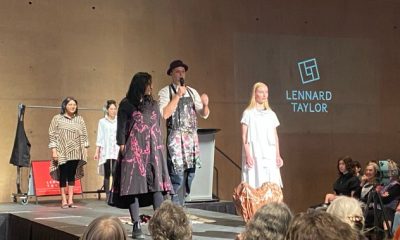Fashion
Why vogue manufacturers in Nigeria make unaffordable garments

Unsurprisingly, Africa’s share of the worldwide attire market is lower than 1%, which, as of 2020, pegs it at $31 billion, in keeping with Euromonitor. Of this comparatively miserly market share, Nigeria holds 15%, an estimated $4.7 billion. Nigeria’s GDP in 2020 was 432.2 billion {dollars}
The query that naturally outcomes from that is: how can the style trade contribute extra to the nation’s GDP?
To deal with this, we have now to start out from the foundation of all clothes manufacturing – textiles and materials. Nigeria nonetheless imports most of its materials from China, regardless that cotton is present in 26 of Nigeria’s 36 states and Nigeria is the fifth-largest cotton-producing nation in West Africa.
As of 2019, Nigeria spent $312,464.56 million to import textiles from China. Though the CBN has tried to revive textile manufacturing within the nation by banning the importation of completed textiles and providing mortgage companies to cotton farmers, these textile supplies nonetheless preserve getting smuggled into the nation by way of the borders of neighbouring states.
In line with the Manufacturing Company of Nigeria (MAN), within the Seventies and early Sixties, Kaduna, Kano, Lagos and Aba had over 100 practical textile factories however by 2010, these textile factories had dwindled so terribly that there have been solely 25 of these 100 factories left. One can solely think about the grim actuality on floor now, a complete 12 years afterwards.
Earlier than the premature demise of those industries, they contributed about N6 billion naira yearly to Nigeria’s GDP.
There are scant figures to mirror the contribution of this trade in more moderen years, however one can anticipate that the numbers gained’t be heartwarming, contemplating how in keeping with the Nigerian Textile Producers Affiliation the nation yearly loses an estimated $325m in potential Worth Added Tax income from textile corporations, on account of smuggling.
The mass exit of companies from the textile trade isn’t any shock; with inflation and devaluation of our foreign money, the price of working companies is at an all-time excessive.
Enterprise homeowners have perennially had to offer their very own water, purchase uncooked supplies and machines, bear the brunt of Nigeria’s incapability to surmount its electrical energy downside, whereas additionally paying hire and workers salaries. Staying afloat may be extra vital than contributing massively to the GDP.
Whereas the Financial institution of the Business has loans designed to alleviate the hardships confronted by fashion-related companies, the query stays: are these loans with 9% rates of interest truly sufficient to assist textile enterprise homeowners, designers and different fashion-centric companies scale? Wouldn’t a flux of direct international funding like we see in Tech be a stronger, extra viable answer?
Whereas that’s certainly a thought to mull over, it may additionally be pertinent to look into how the Nigerian vogue trade is split into design and manufacturing on one aspect, after which gross sales and distribution alternatively.
There appears to be a transparent have to vogue out a means to enhance on the established order. Nigerian vogue designers have to have a greater distribution mannequin than what presently exists.
Solely only a few vogue designers have shops in different states aside from Lagos and Abuja. With regards to distribution, reliance is positioned on unreliable courier companies with excessive supply charges.
The image just isn’t totally gloomy, nonetheless. Occasions like Lagos Trend Week, GTB Trend Weekend and Come up Trend week put Nigeria’s vogue trade within the limelight and showcase its intelligent, ingenious designers.
Actually, many Nigerian designers have gained worldwide recognition. Kenneth Ize, a Lagos Based mostly however Austria born clothier was an LVMH 2019 Prize finalist.
He lately collaborated with Karl Lagerfeld to launch a capsule assortment. Apparently, Ize makes use of Aso-Oke materials regionally made in Nigeria. Different notable Nigerian designers with world affect are Lisa Folawiyo, Deola Sagoe, David Wej and Andrea Iyamah.However their outfits are excessive finish. Andrea needs to make garments of worldwide customary and never for t he common Nigerian.
The marketplace for high fashion designs just isn’t the common Nigerian and, not even many Nigerian celebrities. Nigerian celebrities have Lagos primarily based vogue designers like Xtrabrides Lagos, Stylish by Veekee James, Tubo, and 2207 by Tbally churning stunning however comparable outfits for them.
However the place does that depart the common Nigerian who finds a few of these Nigerian designers outrageously costly?
Reasonably priced ready-to-wear vogue that caters to the common Nigerian is uncommon. Nigerians are nonetheless closely importing ready-to-wear garments from China and shopping for thrift or used garments or counting on our brothers in Aba.
Till extra reasonably priced clothes [not just okrika or akube ones] may be made out there for a mass variety of Nigerians throughout board, we might by no means depart the place we’re.
This can, little doubt, contain extra help and incentives from the federal government for folks within the vogue area, together with the parents at Aba folks making Nigerian-made garments and sneakers.
























